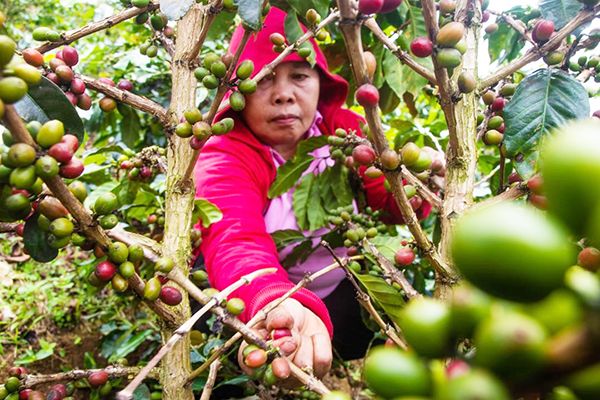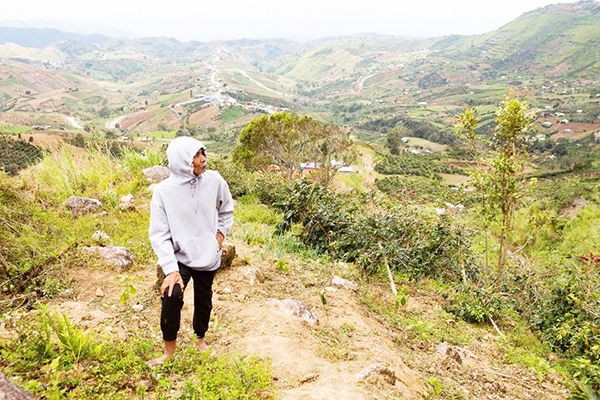BANSALAN, Davao del Sur – Nestled in the foothills of the country’s highest peak, Mount Apo, Barangay Managa here is a home to one of the best sources of coffee not just in the Philippines but also in Southeast Asia.
With an elevation of at least 1,200 meters above sea level, the cool climate and its volcanic soil provide a very suitable condition to grow one of the most popular coffee varieties – Arabica.
A popular haven for coffee lovers, Sitio Balutakay in Barangay Managa is the home of top coffee farmers in the country. They have been competing with fellow coffee growers from the coffee-growing provinces of Benguet, Bukidnon, Nueva Vizcaya, and Sultan Kudarat.

ROSEMARIE Rupecio picks coffee cherries in her farm in Sitio Pluto, Barangay Managa, Bansalan, Davao del Sur. (Keith Bacongco)
Known as the “Winners Circle,” these farmers have consistently earned the top spot in recent coffee competitions in the country.
Among them is 56-year old Rosemarie Rupecio, who was once a vegetable grower before becoming a coffee farmer.
A mother of four, Rupecio’s Arabica coffee earned the sixth spot in the recent Southeast Asia Green Coffee Competition in Thailand with a cupping score of 85.58 percent.
Aside from Rupecio, Manolito Garces, who hails from Bukinon, earned the ninth spot as the competition was dominated by coffee farmers from Thailand and Vietnam.
Thus, the Filipino Coffee Institute picked Rupecio’s winning beans to promote other beans from the country in a world tour, said Rhoda Ruth Pillerin, chief executive officer of Model Cooperative Network (MCN).
MCN has been providing technical assistance to the Balutakay Farmers Cooperative (Bacofa) where Rupecio is one of the key members.
Pillerin added that the tour provides an opportunity not only for Rupecio but also for the other coffee farmers in the region to show to the world that they are capable of producing world-class coffee.
Dot Mediano, a certified Q Arabica Grader, explained that Rupecio’s beans, which is dubbed as Citrus Sparkle, strike an exceptional balance between acidity and sweetness.
Mediano, who is also a Level 2 Scentone Coffee Flavorist, said Citrus Sparkle produces a vibrant citric acidity that brings bright and lemon notes. “While the malic acid brings crisp, apple-like flavor that leaves a smooth nutty finish, which lingers pleasantly.”
He attributed these qualities to the unique terroir on the foothills of the Mount Apo, where at least 160 coffee farmers grow one of the most-sought coffee beans in the country.
From vegetables to coffee
Before becoming a coffee farmer, Rupecio and her husband, Boy, were vegetable farmers in Barangay Managa, a known source of high-value crops such as cabbage, carrots, lettuce, and potatoes.
But due to unstable prices and unpredictable climate patterns, the couple ventured into small-scale gold mining in famous gold rush village of Diwalwal in Monkayo, Davao de Oro in 2006.
When super typhoon “Pablo” (international name “Bopha”) hit the province in 2012, they were forced to abandon the gold mines due to threat of landslides.
The couple returned to Sitio Balutakay and cultivated coffee.
Rupecio attributed her success to good agricultural practices, saying that she always ensures to pick red cherries during harvest.
“I always put my heart into it when I process my beans. I always devote time in depulping, drying, and in the entire process to be able to produce quality coffee beans,” she said.
Without discipline and hard work, Rupecio pointed out, it is impossible to produce top quality coffee.

ROSEMARIE’s husband Boy stands on slopes of their farm in Sitio Pluto, Barangay Managa. (Keith Bacongco)
“Of course, I did not expect to be earn the sixth spot. I also attribute my success to my family,” said Rupecio, who was also among consistent Top 10 winners in recent coffee competitions in the country.
Rupecio’s farm sits at 1,580-meters above sea level, already half of the total elevation of Mount Apo. Her coffee farm sits on the slopes of Sitio Pluto, one of the highest sub-villages of Barangay Managa.
The country’s highest peak has an elevation of 2,954 meters above sea level.
Due to its elevation, Sitio Pluto has been a known home of farmers growing Arabica coffee, which is the most popular coffee variety.
Rupecio acknowledged the Specialty Coffee Depot, under 3VC project of Model Cooperative Network, for their support to bring her beans to the competition in Thailand.
Pillerin added that the initiative is supported under the Strengthening the Implementation of Regional and Local Peace and Development Agendas (SPADe) and Mindanao Peace and Development (MinPAD) RISE Program of the Mindanao Development Authority (MinDA) in partnership with the Department of the Interior and Local Government (DILG), the European Union, and the German Federal Ministry for Economic Cooperation and Development through the Deutsche Gesellschaft für Internationale Zusammenarbeit (GIZ).
She hopes that the recent success of Rupecio could open up more opportunities to the coffee industry in the Davao region.
Pillerin added that MCN has been providing technical assistance to coffee farmers to ensure that they will be able to produce top quality coffee beans as well as market linkages.